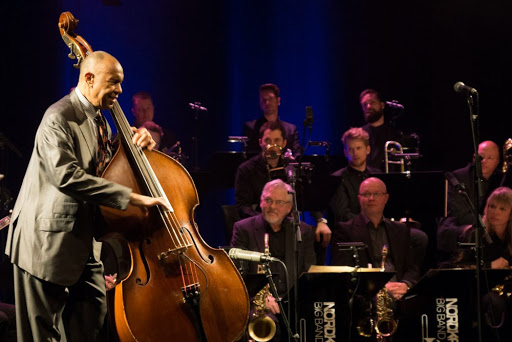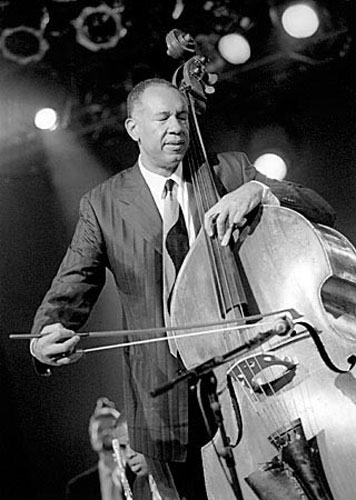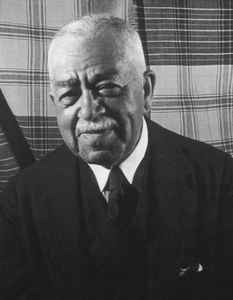by Mike Telin

From Wednesday, March 11 through Saturday, March 14, CityMusic Cleveland will pay homage to this convergence of the two men’s musical lives with performances of Dvořák’s “New World” Symphony. Under the direction of music director Amit Peled, the program also includes the world premiere of Home by jazz bassist and composer John Clayton. The new work is a musical commentary on the current social-political struggles that African Americans are facing.
Clayton will be joined in performance by jazz trumpeter Dominick Farinacci, gospel singer Detrich Burgess, spoken word artist Orlando Watson, and The Spirit of the Groove ensemble. The concerts are free. See our Concert Listings for times and locations.
During a telephone conversation from his home in California, John Clayton said that he used Dvořák’s “New World” Symphony as a point of departure for Home. “I do reference bits of the Dvořák, especially the second movement. I not only allowed myself to be influenced by it musically, but also on a deeper level because the more I thought about it, the more I felt it had all these interesting layers to it — the whole classical world of Dvořák, and him being introduced to Negro songs by Burleigh, and having that change his life.”
Clayton said that the title of the piece grew out of his own musical experiences as a young musician. “I grew up listening to Motown, and my mother played piano and organ in the Baptist church. Then I discovered jazz but my jazz bass teacher insisted that I go back to classical lessons.” Clayton said that after having some life-changing experiences studying with classical teachers, when he began researching Burleigh and Dvořák, he noticed many common denominators. “I thought that it all felt like Home to me.”
Clayton began studying classical bass at the age of sixteen, the same time he heard a recording by jazz pianist Oscar Peterson with the great Ray Brown on bass. “I found out from my classical teacher that Ray Brown was teaching an extension course at UCLA for one semester, so I stopped classical lessons to save money to enroll in that course.”

“He changed my life. I had always been in love with the Romantic and impressionist period of classical works, but I had only heard that music on records played by cellists. In my lessons I could hear what the vibrato was like and what passion sounded like.”
Clayton said that he sees Home as a vehicle to bring communities together. “You have the ‘going home’ theme from the second movement of the symphony. And in terms of community, Cleveland, like many other cities, has these enclaves that don’t really mix and mingle — everyone stays in their own world. So I’m hoping that the way I’ve constructed the piece and the outreach that I’m doing will allow Clevelanders to look across the street and realize that in their ‘home’ there are all these other cool people who are doing these interesting and diverse things. My hope is that people will open their eyes, look around, and say, ‘Hey, not only do I know that you’re there, but now we’re in the same room — let’s do it again in the future.’”
When I asked Clayton how long he’s been working on the piece, he chuckled. “There’s working on it, and working on it. The last couple of weeks it’s been morning, noon, and night — writing, writing, writing.”

Clayton said that he also began to research the music that influenced Burleigh and Dvořák. The research was easier with Dvořák since his influences were well documented. For Burleigh, Clayton began by looking at the countries on the west coast of Africa that were responsible for the large bulk of slave trading. “I found music from those countries and looked at the kinds of scales they were using and things like that.”
The first movement of Home is titled “Africa,” during which the orchestra musicians are asked to sing. “When I was speaking with Amit Peled, he told me that one of the things he likes to do with his orchestra in Maryland is to get them to sing,” Clayton recalled. “My eyes got wide and I asked if he minded if I ran with that idea? He said not at all.”
The composer explained that he begins with one and two voices before moving to four voices, and over the sustained vocal sounds he has written cadenzas for soloists in the orchestra. Clayton said the prominent use of the pentatonic scale in West African music sparked an idea. “While the soloists are each playing pentatonic scales in different keys and percussionists are playing kalimba, the orchestra is singing the word No, which is sending a message about slavery.”

During a recent telephone conversation Watson said that he was excited and honored to have the opportunity to work with John Clayton. “He’s a Grammy Award-winning composer and bassist — he’s not a small deal.”
For Clayton’s new work Home, Watson was given the task of writing poems that would weave the lives of Dvořák and Burleigh with his own. “I like challenges, but it’s taken about three and a half months to pull together three small pieces.”
The Cleveland native said that Love addresses the complexity of relationships — the good and the bad — through the lens of the love life of Dvořák. “His was complicated. He was married to the sister of the love of his life. He and his wife Anna had nine children but three died, so the piece talks about settling down and having a normal life.”
One poem was commissioned by Clayton for his new work. Watson described Homey as a “lighter piece” that focuses on what makes a person feel at home. He touches on the subjects of family, feuds with family, relationships with family, dinner, line-dancing, and music in the house.
“It’s a walk through elements that makes one feel at home from my perspective,” Watson said. “It ties in language from American and European Pop culture and it was important to do that because Dvořák was from Czechoslovakia and his student/mentor Harry Burleigh was from Harlem. I call him a student/mentor because he schooled Dvořák on all things African-American in music, but there was a lot of reciprocity in their relationship.”
Convergence centers on how much Dvořák admired Burleigh’s baritone voice and how the Czech composer wanted to learn about the black American experience. “He discovered that there was no hipper music than what was coming out of the plantations — he had no compass for that type of life and wanted to explore it.
Watson said the poem also talks about how musicians often set aside their differences, specifically differences in color, for the greater good of art. “I use examples like Dr. Dre and Eminem, Whitney Houston and Clive Davis, and of course the Clayton and Hamilton Orchestra.”
The poet noted that many times the black experience is often erased when it comes to the retelling of history, which makes John Clayton’s collaboration with CityMusic Cleveland especially important. “I hope the concerts are recorded because this story needs to be told.”
How did the 28-year-old Watson come to poetry? “I started writing poetry seriously when I was fifteen and stumbled across a creative writing course when I was in high school. I was looking for something that wasn’t dealing with numbers. But I ended up falling in love with the art of storytelling — learning about someone else’s life and adding my take on it to create a new adaptation of another person’s experience.”
While earning his Bachelor’s in Communication and Creative Writing at Youngstown State, Watson founded the Premier Poets Guild. “I facilitated weekly workshops and hosted open mics and symposiums for students — in 2012 we had about thirty active members. It was while at Youngstown that I really developed my chops, and now I’m working with Mr. Clayton.”
Published on ClevelandClassical.com March 10, 2020.
Click here for a printable copy of this article



